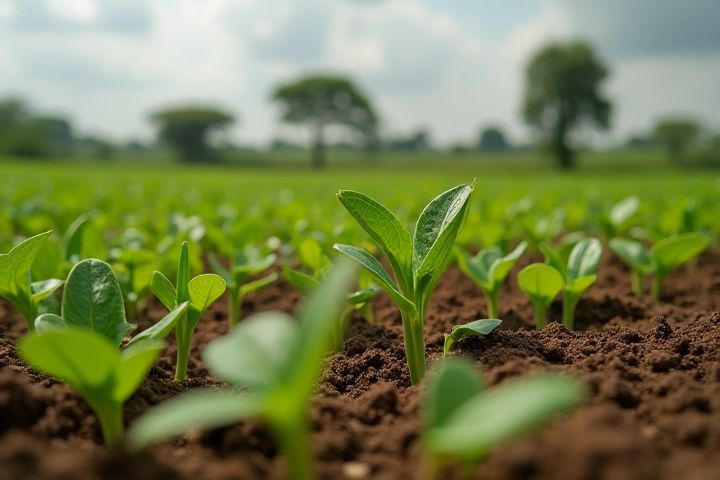
Nigeria offers diverse agricultural opportunities, making it one of the largest agricultural producers in Africa. The country's fertile land, abundant water resources, and favorable climate conditions support the cultivation of various crops, including cocoa, palm oil, cassava, and maize. Additionally, the rich biodiversity allows for livestock farming, with cattle, goats, and poultry being prominent sectors. With the government's increasing emphasis on agricultural innovation and investment, including the promotion of agritech solutions, farmers can access modern technology to enhance productivity. Engaging in Nigeria's agricultural sector not only addresses food security challenges but also contributes significantly to economic growth and job creation.
Diverse Agro-Climatic Zones
Nigeria boasts a multitude of diverse agro-climatic zones, each offering unique agricultural opportunities that cater to various crops and livestock. From the arid northern regions suitable for grains like millet and sorghum, to the fertile southern areas ideal for cash crops such as cocoa and palm oil, farmers can maximize productivity based on local conditions. The rich biodiversity of Nigeria supports the cultivation of both staple and exotic crops, promoting food security and economic growth. You can explore investment possibilities in sustainable practices that leverage these diverse climates to enhance agricultural resilience and community livelihoods.
Growing Population Demand
Nigeria's agricultural landscape is significantly influenced by its rapidly growing population, currently exceeding 200 million. This demographic shift has created a substantial demand for food diversification, enhancing opportunities for farmers to cultivate both staple and cash crops. As urbanization continues to rise, consumers increasingly seek fresh produce, organic options, and processed foods, prompting investment in sustainable agricultural practices. By leveraging technology and modern farming techniques, you can capitalize on this burgeoning market and contribute to food security in Nigeria.
Government Incentives
Nigeria's agricultural sector is bolstered by substantial government incentives aimed at enhancing food production and boosting the economy. These incentives include subsidies on fertilizers, improved access to credit through microfinance institutions, and agricultural extension services that provide farmers with essential training. The government also promotes public-private partnerships to modernize farming techniques and expand market access for smallholder farmers. By leveraging these opportunities, you can contribute to sustainable agriculture while benefiting from the growth of this vital industry.
Access to Export Markets
Nigeria's agricultural sector presents significant opportunities for farmers, particularly through access to export markets. With the country's diverse range of crops like cocoa, cashew, and palm oil, there is substantial potential for international trade. Strategic investments in infrastructure and logistics can enhance the quality and reach of agricultural exports. Engaging in partnerships with global buyers can also foster sustainable growth and improved revenue for local farmers.
Availability of Arable Land
Nigeria boasts a vast expanse of arable land, making it a prime location for agricultural investment and production. With over 84 million hectares of cultivable land, the country is well-positioned to support various crops, including cassava, maize, and rice. This abundance allows farmers to explore diverse farming techniques and crop rotation practices, enhancing soil fertility and yield. As a potential investor, tapping into Nigeria's agricultural sector can lead to sustainable growth and increased food security for its population.
Technological Advancements
Nigeria's agricultural sector is increasingly embracing technological advancements to enhance productivity and sustainability. Precision farming techniques, such as drone technology and IoT sensors, are being adopted to monitor crop health and optimize resource usage, thus boosting yields. Mobile applications provide farmers with real-time access to market prices and weather forecasts, allowing for informed decision-making. By leveraging these innovations, you can contribute to food security while improving income and reducing environmental impact in Nigeria's dynamic agricultural landscape.
Agri-tech Startups
Nigeria's agricultural landscape is increasingly influenced by Agri-tech startups, which harness innovative technologies to enhance farming practices and crop yields. These startups offer solutions such as precision agriculture, drone monitoring, and data analytics, addressing challenges like food security and climate change. With a growing emphasis on sustainability, many initiatives provide farmers with access to real-time market information, efficient supply chain management, and financial services. Engaging with these Agri-tech innovations can significantly improve productivity and profitability for local farmers, fostering economic growth in the region.
Value Chain Development
Value chain development in Nigeria's agriculture emphasizes enhancing efficiency and productivity at every stage, from production to marketing. Innovations in farming techniques, such as precision agriculture and organic farming, are gaining traction among local farmers. By integrating technology and sustainable practices, stakeholders aim to increase yield and reduce post-harvest losses. Access to financing and supportive policies is critical for enabling smallholder farmers to participate effectively in this evolving agricultural landscape.
Strategic Location in Africa
Nigeria's strategic location in West Africa positions it as a vital agricultural hub, benefiting from diverse climatic conditions that support a variety of crops such as cassava, yams, and maize. The country has vast arable land, with over 84 million hectares suitable for agriculture, making it one of the largest agricultural potentials in Africa. You can tap into the thriving market for agribusiness, as Nigeria's population exceeds 200 million, ensuring consistent demand for food products. Financial incentives and government initiatives aimed at enhancing agricultural production further bolster the opportunities for investment and growth in this sector.
Financial Support and Grants
Agricultural opportunities in Nigeria thrive primarily through various financial support programs and grants tailored to boost farm productivity and sustainability. The government and private organizations provide funding initiatives that require minimal collateral, making it easier for farmers to access capital. These financial resources often come with technical assistance, training, and mentorship, designed to enhance agricultural practices and increase yield. Engaging in these programs can significantly improve your farming operations and contribute to the economic development of the community.
